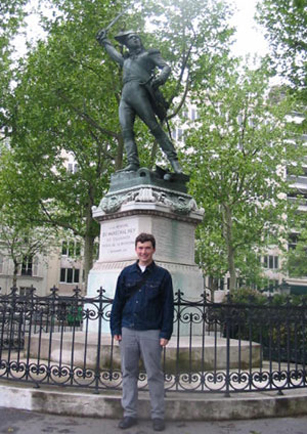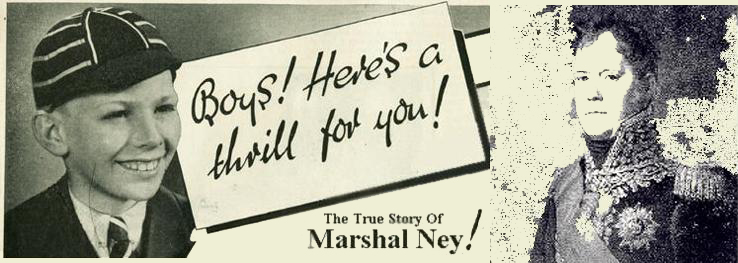Michel Ney: The Fake One and the Real
Empress of Asia's rambutan-gobbling, nightshirt-sporting Michel Ney may be fictitious, but his Napoleonic-era namesake is entirely real. I'd never heard of the guy before reading The Oxford Book of Military Anecdotes (1987; Max Hastings, editor), which I picked up for cheap when the used bookstore around the corner from our old apartment at Knight & Kingsway went out of business, and once I had heard of him I couldn't believe I hadn't before. Really, who can resist the hero of page 221?
"...Ney then traversed the town and crossed the Niemen, constantly fighting, retreating but never flying, marching after all the others, supporting to the last moment the honour of Napoleon's arms, and for the hundredth time during the last forty days and forty nights, putting his life and liberty in jeopardy to save just a few more Frenchmen.
"At Gumbinnen in East Prussia on 15 December General Matthieu Dumas was just sitting down to his first decent breakfast in months when someone kicked the door open. There stood before him a man in a ragged brown coat, with a long beard, dishevelled and with his face darkened as if it had been burned, his eyes red-rimmed and glaring. Underneath his coat he wore the rags and shreds of a discoloured and filthy uniform.
"'Here I am then,' the newcomer exclaimed.
"'But who are you?' the general cried, alarmed.
"'What! Don't you recognize me? I am Marshal Ney: the rearguard of the Grande Armée! I have fired the last shot on the bridge at Kovno. I have thrown the last of our muskets into the Niemen. I have made my way here across a hundred fields of snow. Also I'm damnable hungry. Get someone to bring me a plate of soup...'
"Once fed, bathed and with his uniform stitched up he hurried off to Königsberg and a traumatic conference with the King of Naples."
Nice! I flipped to the Acknowledgements to find the source of the story: Marshal Ney: The Romance and the Real by Raymond Horricks (Midas Books, 1982.) The Vancouver Public Library has a copy and it's as good as its excerpt -- the disasters of the Russian campaign and Waterloo are painted on vast canvases even as we learn that everyone made fun of Ney for wearing a ponytail well into the 1790's. The story of his downfall is more intriguing still: instructed by the restored Bourbon monarchy in 1815 to capture Napoleon, he instead sides with his old friend, thinking it will prevent civil war when he sees the overwhelming support Bonaparte carries amongst the common folk.
 This delightful 2004 photo of the author in front of the Marshal Ney statue on Blvd Saint-Michel, Paris, was chosen ahead of a photo of the author's Marshal Ney figurine from the Drapeaux de France store and was even deemed superior to the 2000 photo of the author giving the thumbs-up to the Marshal Ney bust at Versailles. It's time to shake your head at the author.
This delightful 2004 photo of the author in front of the Marshal Ney statue on Blvd Saint-Michel, Paris, was chosen ahead of a photo of the author's Marshal Ney figurine from the Drapeaux de France store and was even deemed superior to the 2000 photo of the author giving the thumbs-up to the Marshal Ney bust at Versailles. It's time to shake your head at the author.
On another tack entirely: Epigrams!
It's kind of cool when a book has an epigram at the beginning; Kingdom of Monkeys, for instance, has one from Paul Bowles' novel The Sheltering Sky. A good epigram can set the tone for the work to follow as well as setting the newer piece in the continuum of literary history, by demonstrating how writers of the past had approached a similar theme or subject. But sometimes it seems like the epigram is only there to make the present writer look smart. Even so, I jotted down possible Empress epigrams over a couple of years and amassed quite a collection, eventually narrowing my choices to the final three on this list, until I realized that Empress is not my story but Harry's, and Harry has too many irons in the fire to sit around jotting down epigrams all day. So the novel does not have an epigram. But by putting up this list I must still be striving desperately to look smart.
"In reality, if you, for instance, experienced war and being a prisoner of war (essential elements of civilization!) - if you experienced certain things, you were just technically appalled, knocked out of gauge, like a motor, an apparatus. Out of joint. Without use or sense or comprehension. Just a stupid thing."
--Vincent Mahieu, The Hunt for the Heart
"If ever a seaman wanted drugs, it's me."
--Robert Louis Stevenson, Treasure Island
"I cannot rest from travel: I will drink
Life to the lees: all times I have enjoy'd
Greatly, have suffer'd greatly, both with those
That loved me, and alone."
--Alfred Tennyson, "Ulysses"
"For five days we were compelled to remain in the forest on account of the weather; it rained great part of the day, and throughout the night; the torrents overflowed, and the earth was nothing but a sea of mud. I never in my life passed such wretched nights, as all the time we had to remain with our wet clothes on our backs, and I cannot describe what we suffered."
--Henri Mouhot,
Travels in the Central Parts of Indo-China, Cambodia and Laos During the Years 1858, 1859 and 1860
"What we call experience is often a dreadful list of ghastly mistakes."
--J. Chalmers Da Costa, The Trials and Triumphs of the Surgeon
"This sea is infested with pirates, to meet whom is death. The expanse of ocean is boundless, east and west are not distinguishable; only by observation of the sun, moon and constellations is progress to be made. In cloudy and rainy weather our vessel drifted at the mercy of the wind, without keeping any definite source."
--Buddhist monk Fa-Hsien en route from China to India, 413 AD
"He missed the past; the quiet nothingness of lying in bed next to his dying wife, stroking her wet hair as she breathed with difficulty, and opened her eyes somewhat, every few days. Those were gentle times; how the light came through the window, how he barely slept at all, and how she lived with pain."
--Sheila Heti, The Middle Stories
"Our stories are likely to be tales not of those who made it but of those who made it back, from the awful experience - the North, the snowstorm, the sinking ship - that killed everyone else."
--Margaret Atwood, Survival
"My love's on a faraway island,
A sweet girl, doing nothing"
--Chairil Anwar, "My Love's On A Faraway Island"
"Nevertheless, I want to get home, and can think of nothing else. If some god wrecks me when I am on the sea, I will bear it and make the best of it. I have had infinite trouble both by land and sea already, so let this go with the rest."
--The Odyssey
"We ain't through
We're just older"
--Rick Maddocks, "A Hammer and a Bell"
"So we were married. I was out of one war and into another."
--The Veterans' Years, compiled by Barry Broadfoot.
"…and if I begin to babble something about islands and adventures put it down to my derangement; I do not know to what these ruins belong, and it's no longer possible to make out of them the story of the man. The whole of man is in what is left for him to accomplish; all the rest is made of bits and fragments which can't be compassed with a glance. Yes, yes, yes, sometimes you dig up something that is past, and think; this is what I am."
--Karel Capek, Meteor
"But though I was now past the prime of life, my untamed spirit rebelled against my declining years, and I once again longed to see the world and travel in the lands of men."
--The Last Voyage of Sinbad the Sailor
"...we let her alone, and let her float wherever the current wanted her to, then we talked about all kinds of things - we was always naked, day and night..."
--Mark Twain, The Adventures of Huckleberry Finn
"I have often been asked, since, what single ordinary thing I would take into captivity in the tropics, and my answer has always been the same - a crate of baby powder."
--Geoffrey Pharaoh Adams, No Time For Geishas















